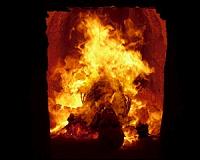 |
Riyadh, Saudi Arabia (UPI) Nov 22, 2010 The illness of King Abdallah, a key U.S. ally against Iran, has stirred speculation that a succession battle is swelling between the 86-year-old monarch's branch of the House of Saudi and the powerful Sudeiri clan. Abdallah was to fly to the United States this week for treatment of a reported back ailment but he has been curtailing his activities since June with no clear explanation. In the past, such abrupt cancellations of scheduled programs or foreign visits have usually indicated significant political developments. On Nov. 17, the official Saudi Press Agency announced that Prince Badr, the long-serving deputy commander of the Saudi Arabian National Guard, known as SANG, had asked to be relieved because of ill health. Within minutes, SPA reported that Badr's request had been accepted by Abdallah and that the monarch's son, Prince Mitab, had been named as SANG commander, as well as a minister of state and a member of the Council of Ministers. "Unstated was that King Abdallah, who has served as SANG commander since 1962, had given up the position," observed Simon Henderson, an expert on Saudi Arabia currently with the Washington Institute for Near East Policy. "The announcements have added to speculation that rivalry between the king and various senior princes is peaking," he wrote in a Nov. 18 analysis. "It remains to be seen whether leadership change in the kingdom -- the world's largest oil exporter and home of the two holiest places in Islam -- will be carefully orchestrated or lead to open squabbling." Abdallah failed to attend the weekly Council of Ministers Nov. 8 and four days later was reported to be resting because of a herniated -- ruptured -- disc. The following day, his half-brother, Prince Sultan, the crown prince, long-serving defense minister and Abdallah's greatest rival, returned to Riyadh from Morocco where he had been recuperating from a long bout with cancer. Sultan, 86, was seen to be demonstrating he was ready to take over from Abdallah, who became monarch in 2005 with the death of King Fahd, another half-brother. However, Abdallah had governed the country since 1996, when Fahd suffered a stroke. It seems unlikely Sultan will ever be king. Henderson noted Sultan's health is so bad "his mental faculties reportedly are so poor that he's no longer able to function at the posts he still holds." The second-in-line for the throne is Prince Nayef, the hard-line interior minister who heads the nation's security forces, the third arm of the kingdom's military organizations. Nayef, 77, has been seen as a future king, particularly in view of Sultan's serious medical problems. The leadership changes in SANG, ensuring that it remains firmly in the hands of Abdallah's family, could signal similar moves with the armed forces and the security forces headed by his rivals. They regard these commands as their personal fiefdoms, to ensure clan continuity. The Sudeiris, who dominate the royal house, comprise the sons of King Abdelaziz, who founded modern Saudi Arabia in 1932, whose mother was Princess Hussa of the Sudeiri clan. Abdallah had a different mother. The rivalry between these two factions is the principal schism within the royal house, which embraces some 7,000 princes. Abdallah was given command of the National Guard by his father in 1962 and Sultan got the Ministry of Defense and Aviation to maintain a military balance between the competing royal factions. Abdallah forged SANG into a military formation considered to be more effective than the 75,000-strong army, commanded by Sultan, the dominant figure in the Sudeiri clan. The primary mission of the largely Bedouin Guard, which was Abdallah's original power base, has been to protect the royal family. But it is now seen as a counterweight to the army that has altered the balance of power between the Sudeiris and their royal rivals. Since 1962, "there has been a stable balance between both the regular armed forces and SANG," the U.S.-based global security consultancy Stratfor observed. "But with both Abdullah and Sultan now in their mid-80s, the two forces are in the midst of leadership transitions." Given that Abdallah and Sultan "hold not only the top two political positions in the kingdom, but have also headed these parallel security structures for nearly half a century, the transitions are extremely sensitive matters."
Share This Article With Planet Earth
Related Links Powering The World in the 21st Century at Energy-Daily.com
 China funeral parlour stops cremations amid diesel shortage
China funeral parlour stops cremations amid diesel shortageBeijing (AFP) Nov 20, 2010 A nationwide shortage of diesel forced a Chinese funeral parlour to suspend cremations last week after it ran out of the fuel needed for three furnaces, state media reported. Longxing Funeral Parlour in the southwestern mega-city of Chongqing stopped cremating bodies last Sunday after using up the last of its diesel reserves, the Chongqing Evening News reported this week. Funeral parlou ... read more |
|
| The content herein, unless otherwise known to be public domain, are Copyright 1995-2010 - SpaceDaily. AFP and UPI Wire Stories are copyright Agence France-Presse and United Press International. ESA Portal Reports are copyright European Space Agency. All NASA sourced material is public domain. Additional copyrights may apply in whole or part to other bona fide parties. Advertising does not imply endorsement,agreement or approval of any opinions, statements or information provided by SpaceDaily on any Web page published or hosted by SpaceDaily. Privacy Statement |